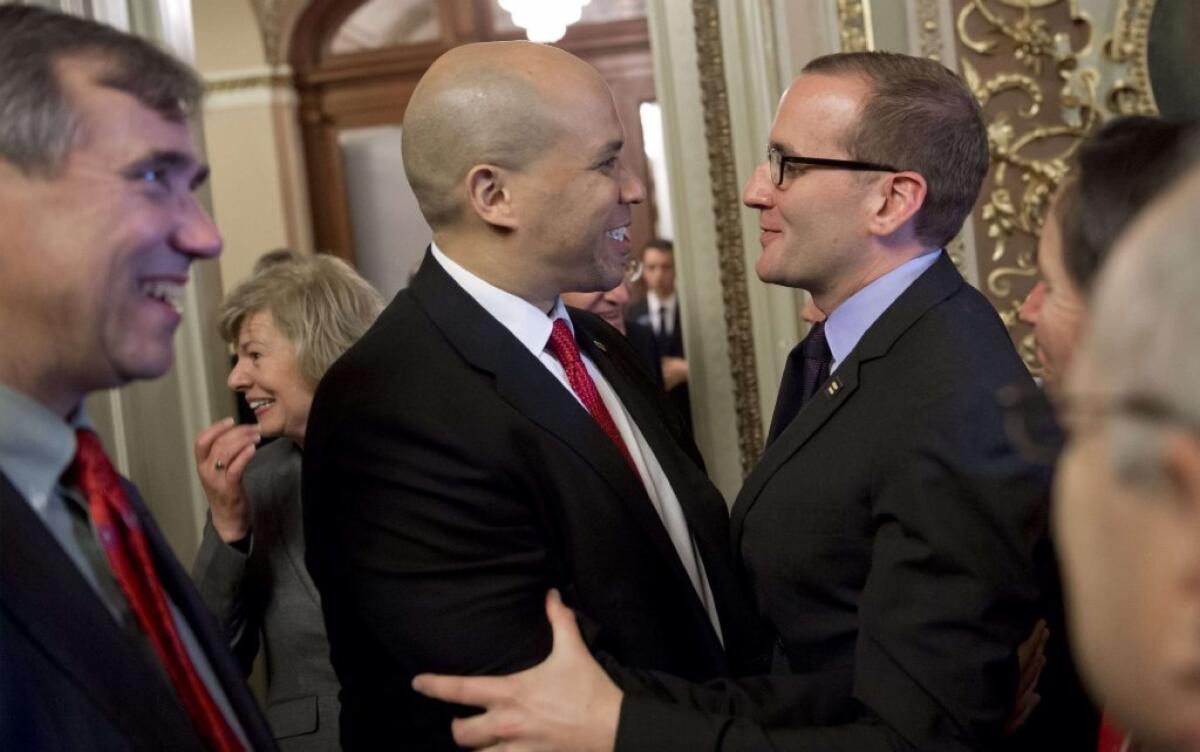Opinion: Did employment commission just make a law protecting LGBT workers unnecessary?

U.S. Sen. Cory Booker (D-N.J.), left, embraces Chad Griffin of the Human Rights Campaign after the Senate passed the Employment Non-Discrimination Act in 2013.
- Share via
As a Los Angeles Times editorial recently noted, gay rights activists are seeking to maintain the momentum from last month’s Supreme Court decision legalizing same-sex marriage. A key objective of any new legislation in Congress would be a federal prohibition of employment discrimination on the basis of sexual orientation or gender identity.
But what if such legislation -- which is likely to encounter significant Republican opposition -- wasn’t necessary because such discrimination is already illegal? That’s the reasoning behind some creative rule-making by the U.S. Equal Employment Opportunity Commission.
Last week, in a case involving an applicant for a flight controller’s position, the panel ruled that job discrimination against gays violates Title VII of the Civil Rights Act, which outlaws discrimination on the basis of “sex” (a reference to gender). In 2012, the agency determined that discrimination against transgender individuals was also a form of sex discrimination.
The 3-2 ruling elaborates on the doctrine that subjecting employees to sex-role stereotypes is a form of sexual discrimination. Quoting a federal court, the EEOC said that “stereotypes about homosexuality are directly related to our stereotypes about the proper roles of men and women. ... The harasser may discriminate against an openly gay co-worker, or a co-worker that he perceives to be gay, whether effeminate or not, because he thinks ‘real’ men should date women, and not other men.”
So is it really that easy? Would Congress be wasting its time to debate a new version of the Employment Non-Discrimination Act, a bill that in different versions passed both houses of Congress but never became law?
Not so fast.
First, the EEOC’s legal theory could be successfully challenged in court. Some commentators have noted that, in its recent decision upholding the Obama administration’s interpretation of the subsidy provisions of the Affordable Care Act, the Supreme Court rested its decision not on deference to Internal Revenue Service regulations, but on the court’s own reading of the law. Then there is the fact that the administration’s latest executive action to spare some immigrants from deportation has encountered judicial resistance.
Second, the EEOC’s interpretive alchemy feeds the political narrative -- already evident in the controversy over immigration -- that the Obama administration is determined to stage an end run around congressional authority.
The EEOC seems to want to have it both ways. In an interview with the Washington Blade, Commissioner Chai Feldblum said: “What the EEOC has done is offer a chance to bring cases of LGBT discrimination under existing law. That is a very big deal. But that does not remove the need for an explicit federal law that would give LGBT people and employers across the country absolute certainty that discrimination on the basis of sexual orientation and gender identity will be prohibited.”
Lawyers call this sort of approach “belt and suspenders” -- but there is at least a possibility that, now that the EEOC has provided the belt, some in Congress will be less interested in adding the suspenders.
That would be a tragedy. Even if the EEOC’s interpretation were to be ratified by the Supreme Court -- a big if -- there is a value to having the people’s representatives in Congress explicitly affirm that workplace discrimination against gay, lesbian and transgender Americans is just as abhorrent as discrimination on the basis of race, gender or religion.
Twitter: @MichaelMcGough3
More to Read
A cure for the common opinion
Get thought-provoking perspectives with our weekly newsletter.
You may occasionally receive promotional content from the Los Angeles Times.










